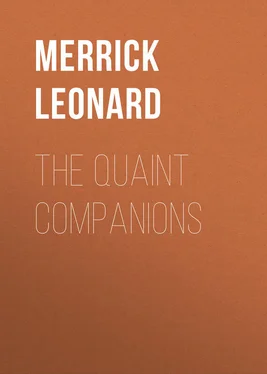Leonard Merrick - The Quaint Companions
Здесь есть возможность читать онлайн «Leonard Merrick - The Quaint Companions» — ознакомительный отрывок электронной книги совершенно бесплатно, а после прочтения отрывка купить полную версию. В некоторых случаях можно слушать аудио, скачать через торрент в формате fb2 и присутствует краткое содержание. Жанр: foreign_antique, foreign_prose, на английском языке. Описание произведения, (предисловие) а так же отзывы посетителей доступны на портале библиотеки ЛибКат.
- Название:The Quaint Companions
- Автор:
- Жанр:
- Год:неизвестен
- ISBN:нет данных
- Рейтинг книги:3 / 5. Голосов: 1
-
Избранное:Добавить в избранное
- Отзывы:
-
Ваша оценка:
- 60
- 1
- 2
- 3
- 4
- 5
The Quaint Companions: краткое содержание, описание и аннотация
Предлагаем к чтению аннотацию, описание, краткое содержание или предисловие (зависит от того, что написал сам автор книги «The Quaint Companions»). Если вы не нашли необходимую информацию о книге — напишите в комментариях, мы постараемся отыскать её.
The Quaint Companions — читать онлайн ознакомительный отрывок
Ниже представлен текст книги, разбитый по страницам. Система сохранения места последней прочитанной страницы, позволяет с удобством читать онлайн бесплатно книгу «The Quaint Companions», без необходимости каждый раз заново искать на чём Вы остановились. Поставьте закладку, и сможете в любой момент перейти на страницу, на которой закончили чтение.
Интервал:
Закладка:
The threat, the idea that she thought him capable of striking her, sobered him. He entered shamefacedly.
"You needn't be afraid that I shall hurt you," he muttered.
"Needn't I?" she said. "How do I know that? I don't know what you might do, you bully, you – you coward!"
He winced, and stood looking at the ground in silence. Then:
"I didn't mean to bully you," he said huskily. "I – I'm sorry, Ownie, I'll never do it again."
She saw that she was mistress of the situation. Her hold on the bell-pull relaxed; her tone acquired a tinge of shrewishness.
"You won't ever have the chance again," she retorted, "don't flatter yourself! You've shown me what I might expect – I won't live with you."
Though the words were empty enough, they frightened him. He took a step towards her in a panic.
"Ownie!" he cried. And again: "Ownie, I'm sorry!"
"It's not the least consequence whether you're sorry or not," she sneered; she was quite composed now. "I'm sure I don't care. It's very easy to say you're sorry after you've shouted at me, and insulted me as much as you want to. Yes, insulted me, you – Ah, it's what I might have expected! I'm ashamed of having married you. Only a man – a man like you would talk so to a woman."
She saw him shiver. She was reminded suddenly of a dog that Harris used to beat. There was a pause, in which she observed the effect of her taunt with satisfaction. After a few seconds she turned away, and began to unpin her hat at the toilet-table.
"It was because I was jealous," he stammered; "I couldn't help it – I didn't mean to insult you. Ah, take that back – don't say you're ashamed of me! Trust me, and you shall see how good I'll be to you in future. I love you, I love you, you don't know how I love you. Look at yourself in the glass. See how beautiful you are. How can you wonder that I'm jealous? Look at your hair – how soft it is! And your skin – it feels like a flower. I'd die for you. It drove me mad to see you look at another man like that. I know, I know you didn't mean anything by it, but I couldn't bear it. Ownie, forgive me!"
She made no answer. She moved carelessly across the room, tossing her cloak on to the bed. Her slippers lay by an armchair, and she sat down in it, bending over her boots. He was on his knees before her in an instant, trying to seize her hands. She snatched them away with a gesture of aversion, and clasped them behind her head.
"I am ashamed," she repeated. "You've disgusted me. I'd let any white man make love to me, would I? Anyhow no white, man would be beast enough to say such a thing."
He put out his hands again – not to caress her this time, but as if to ward off the daggers she was planting in him. The tears welled into his eyes, and, with a thrill of power, she watched one trickle down the black face.
"Forgive me," he implored.
"It serves me right for not listening to advice," she went on. "I ought to have known what you would be. You can't help being jealous? What right have you got to be jealous – how dare you use such a word to me? Do you suppose that I'm never going to speak to any other man again because I married you?"
"I was wrong," he cried, "I know I was wrong – don't say you're 'ashamed'! It's just because I'm a coloured man that the jealousy comes. Oh, can't you understand? Try to make allowances for me. Don't you see, don't you see? – I remember my colour all the time, I never forget it; and when you sat there talking so – talking like that to him, I hated him because he was white. But I'll never complain any more, I swear I won't! You shall do as you like – I know how good you are."
"There aren't many women who would forgive such behaviour, I can tell you," she said sulkily. She thrust out her foot, and he began to unbutton her boot. "How do I know you'll keep your word?"
"Trust me," he begged. "Be kind to me – only trust me."
She lay back in the chair without replying; her pretty face was stubborn still. He drew off her boots. "Be kind to me," he entreated, "be kind to me." He covered her feet with kisses. He knelt there, suing to her, until she said at last that she forgave.
CHAPTER VI
But it was not in the woman's nature to refrain from accepting attentions and showing that they pleased her; and it was not in human nature for a husband who loved her to keep his oath and be tolerant. Before six months had passed there had been half-a-dozen such scenes. Lee upbraided more violently – the reconciliations did not always follow so soon, but the order of things was always the same; she flirted, and he abused her, and then grovelled for pardon till her resentment was assuaged. Her perception of the extent to which she could make him grovel awoke a savage instinct in the woman. Though her faults were the outcome of weakness, not of strength, the taste of power excited her, and she often remained obdurate merely to prolong the enjoyment of it. Once she even wounded him for no other reason than to gratify the taste. They had returned from a concert, and to see the man, fresh from his triumph, abasing himself before her so shamelessly, gave her a vicious pleasure.
They had taken a house at Hampstead, a house with an ample garden, and the necessary stabling. Except the practice-room, with its bare, polished floor, its windows curtainless – containing nothing but the piano and two chairs – she had revelled in the furnishing of every corner. She wrote to her mother with pride that "there wasn't a cheap thing in the place." With almost equal truth she might have added that there wasn't a thing beautiful. She and Lee had one point in common: both admired the ostentatious, and he found his surroundings nearly ornate enough to justify the amount that had been wasted on them.
And she had half-a-dozen servants; the tenor's stepchild was wheeled to the Heath now in fine apparel by a competent nurse. In her servants Mrs. Lee aroused less sympathy than in the men whom her husband called his "friends"; they looked down upon her for having married "that blacky," who was so much more considerate to them as a master than was she as a mistress. Instinctively she knew it, and it was a frequent thing for a maid at The Woodlands to be discharged on the grounds of being "disrespectful in her manner." A landlady's daughter and negro's wife was the last person likely to submit to disrespect.
One or two women whom she met had also appeared to take a different view of her position from that taken by the men; she found feminine society a shade irksome after her marriage. There were a few mortifying incidents from the first; still she knew that people who were envious always pretended to be disdainful; and the benefits were countless, she reminded herself as time went by. But for the knowledge of what was in store, it would have sufficed for composure to reflect that the other women would act just the same, assuming they had the chance. Her real humiliation came in the form of a baby.
It was a little yellow baby who in the hour of its birth was not expected to live. She did not hear that until some days later – and when she was told, she closed her eyes, for fear they should betray her thought. It was a little yellow baby that she sickened to know her own, and when they put it in her arms, her flesh shrank from it. Lee's joy enraged her. She hated him as he hung smiling over the pillow, was angered by what she felt to be his callousness in supposing she could be glad.
He was enraptured: the child was hers and his. With the passing of the months, he had come to seek more of her than acceptance, and it seemed to him that henceforth they must be one. She was no longer merely the sovereign who permitted – she was the mother of his boy.
But his mistake was very brief, and it was his child who proclaimed to the man that his marriage had been a madness. It was when he saw that she was ashamed of her motherhood that he was ashamed of his passion; it was her contempt for their baby that showed him how he himself was despised.
Читать дальшеИнтервал:
Закладка:
Похожие книги на «The Quaint Companions»
Представляем Вашему вниманию похожие книги на «The Quaint Companions» списком для выбора. Мы отобрали схожую по названию и смыслу литературу в надежде предоставить читателям больше вариантов отыскать новые, интересные, ещё непрочитанные произведения.
Обсуждение, отзывы о книге «The Quaint Companions» и просто собственные мнения читателей. Оставьте ваши комментарии, напишите, что Вы думаете о произведении, его смысле или главных героях. Укажите что конкретно понравилось, а что нет, и почему Вы так считаете.












